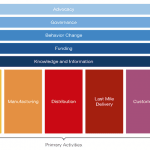Social Business Roundup: An SDG Lovefest at Davos, a New Rival for M-Pesa and a Really Big Direct Investment Fund
Given the populist mood of the U.S. and a good chunk of Europe, observers have wondered whether the annual meeting of the global elites at the World Economic Forum in Davos, Switzerland, has lost its relevance. Perhaps. But the businesspeople and policymakers gathered there have still had plenty to talk about on the sustainable investing and social enterprise fronts.
The SDG Knowledge Hub has an excellent roundup of the many business and investment reports that dropped onto Davos like a fresh layer of newly fallen snow. One of the more eye-catching forecasts came from the Business and Sustainable Development Commission, titled “Better Business, Better World.” According to the article, the report “suggests that embedding the UN Sustainable Development Goals into the strategies of private companies could create an additional US$8 trillion across the wider economy.”
Global health lessons learned
Also from Davos, an important global health headline: “Donors and Drug Makers Offer $500 Million to Control Global Epidemics.” In response to the lack of vaccines to fight the Ebola epidemic, six pharmaceutical firms plus several donors – the Gates Foundation, Wellcome Trust and the governments of Japan and Norway – formed the Coalition for Epidemic Preparedness Innovations. The coalition’s first $500 million (they hope to raise billions more) will be spent developing vaccines against Lassa fever, the Nipah virus and Middle East Respiratory Syndrome, plus improving DNA and RNA vaccine technology.
And for the Workers at Davos and Beyond …
It seems fair to ask: Should the interventions to help the poor share the stage with an agenda for the middle class?
“More rights to bargain for workers, that’s the part where Davos man is going to get stuck,” Nobel laureate economist Joseph E. Stiglitz, told The New York Times. “The stark reality is that globalization has reduced the bargaining power of workers, and corporations have taken advantage of it.”
MasterCard joins Visa as potential Rival to M-Pesa in Kenya
Mastercard is getting into Kenya’s microcommerce market, announcing the launch of a new mobile platform called 2Kuze that lets consumers use their phones to buy goods. It’s initially aimed at smallholder farmers, but it may mark the beginning of a larger expansion into mobile finance in Kenya which could bring Mastercard into competition with networks like M-Pesa – and with its traditional rival, Visa, which debuted its own mobile payments platform there last fall. Expect more of these incursions, as rivals both foreign and domestic vie for a slice of M-Pesa’s roughly $51 billion in annual transactions.
TPG’s ‘Rise’
TPG’s co-CEO Jim Coulter and Growth CEO Bill McGlashnan talked with Bloomberg about their plans to build a $2 billion fund, Rise, with specific investment products, to back sustainable and social enterprises. (Yes, that’s the one backed by Bono.) It also will be working with base of the pyramid business investor Elevar Equity to make investments. Bloomberg’s Erik Schatzker moves the discussion too quickly away from impact investing toward more mainstream market concerns, but it’s still worth hearing from the leaders of what could be the biggest direct investment fund on the planet. (Check out the interview or watch an embedded version below.)
Shifting the focus to NCDs
Twenty-two pharmaceutical firms are launching the Access Accelerated initiative to focus on chronic diseases of the poor. They’ve committed $50 million over three years to fight non-communicable diseases (NCDs) – as opposed to infectious diseases, which is where the global health spotlight has historically been pointed. The shift makes sense; 70 percent of all deaths worldwide are attributable to NCDs, the vast majority in poor countries.
A major financial inclusion threat, hidden in plain sight
It’s largely gotten lost in the growing public debate over Obamacare’s future, but the Center for Financial Inclusion recently highlighted one of the many repercussions of repealing the law: “It could be the single biggest setback to financial inclusion in the U.S. since the 2008 financial crisis.” As the CFI points out, insurance is an important element of financial inclusion, allowing clients to secure their assets, homes and health. If some or all of the estimated 20 million Americans who got insurance under Obamacare lose coverage, the financial inclusion community will have a major new challenge on its hands.
Investing in AI … Down on the Farm
Tej Kohli, the Indian venture capitalist, has launched a $25 million technology-focused impact investment fund – one that would mingle robots with agriculture in emerging markets. The new fund will invest in early-stage firms generating social and environmental impact that also are dabbling in artificial intelligence, robotics, fintech, agtech, genomics and renewable energy. Kohli Ventures, Kohli Impact Investment Initiative and his family office philanthropy will back the fund. In 2015, Kohli invested in renewable energy firm Zynergy.
New initiative aims to ‘mainstream financial inclusion’
The Center for Financial Inclusion at Accion, the Institute of International Finance and MetLife Foundation recently announced a two-year initiative to help the financial services industry reach unserved and underserved populations. Titled “Mainstreaming Financial Inclusion: Best Practices,” the project will use “research, knowledge exchange, best practices, real world examples and expert insights” to “identify and transmit practical guidance that financial institutions can use to expand quality services to the poor.” It’s part of MetLife Foundation’s $200 million, five-year commitment to improving financial inclusion worldwide.
Lawyers rock. No, seriously.
A World Health Organization report released this week “aims to raise awareness about the role that the reform of public health laws can play in advancing the right to health.” It’s a timely global resource on how laws can safeguard health in the face of shifting politics and other powerful interests.
Nigeria bans bitcoin for banks
There’s a lot of excitement over cryptocurrencies’ potential to transform finance in Africa, and no shortage of startups leveraging the technology for low-cost remittances and other services. But this week, the Central Bank of Nigeria banned banks from all transactions in the currencies. The reason? The bank is concerned about the money laundering and terrorism financing risks presented by virtual currencies, which offer anonymous and largely untraceable transactions. The ban doesn’t extend to individuals, and some analysts expect it to be temporary, but to ultimately lead to stricter regulations. In the meantime, innovators have plenty of other sandboxes to play in.
Another Dimension for Entrepreneurship
“We’re currently in the fourth industrial revolution where technologies such as 3D printing have taken a forefront in looking at ways in which countries using this technology can actually revolutionise the manufacturing industry.” That’s Njideka Harry, founder of Youth for Technology Foundation. The group is working to inspire a new generation of Nigerian entrepreneurs to pursue Science, Technology, Engineering & Math (STEM) to propel careers and businesses. And they’re using 3D printing as one way to expose students to tech. An interview with Harry by Ventures Africa was published last month, but is still worth a read.
Powered Up In Nepal
“All I am doing is managing demand and supply with maximum efficiency and complete honesty. Now, no one is getting electricity that belongs to someone else,” said Kul Man Ghising, who was appointed managing director of the Nepal Electricity Authority in September. His appointment has radically impacted the distribution of power, mostly by eliminating corruption. Check out how it’s helping businesses and the people of Nepal in this Christian Science Monitor article, “How Nepal got the electricity flowing.” (Hat tip: Aspen Network of Development Entrepreneurs).
Photo: U.S. Vice President Joe Biden addressing the World Economic Forum in Davos, Switzerland, by the U.S. Embassy, Bern, Switzerland, via Flickr
- Categories
- Agriculture, Health Care



